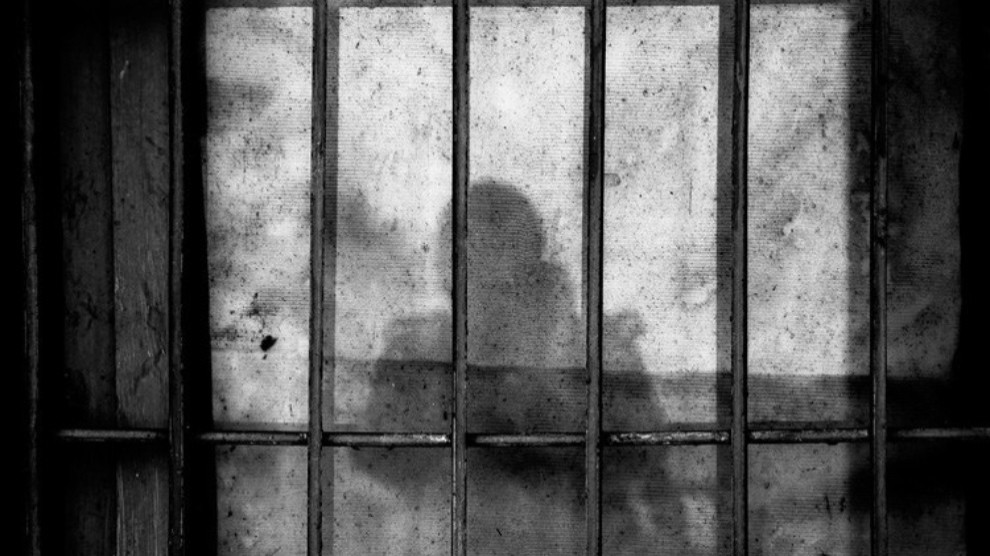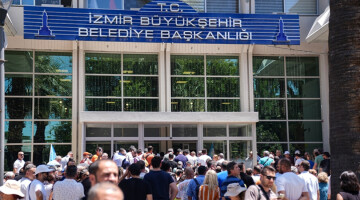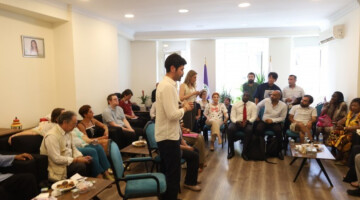Lawyer Firat Vural said the Imrali isolation system goes beyond just the island and is actually an expression of the insolubility of the Kurdish issue, adding that the prisoners want to solve that exact knot there.
Human Rights Association (IHD) Istanbul Chapter Executive Council Member and Lawyers for Freedom (OHD) Istanbul Chapter Prisons Commission Member Lawyer Firat Vural spoke to the ANF.
We hear that as hunger strikes continue in prisons, rights violations have increased. Could you share the information the IHD has on this issue?
In the hunger strike process that started with DTK Co-chair Leyla Guven and spread throughout all prisons, we as the IHD Prisons Commission saw many rights violations in prisons we visited, both recorded by us after being witnessed in person and reaching us through letters from prisons. Some rights violations in particular in certain pilot prisons did intensify with the hunger strikes. The prison administration should provide lemons, sugar, salt and water to prisoners on hunger strikes, but there are instances where the prison provides no supplies at all to the many prisoners on hunger strikes. We found that in Silivri, Tekirdag, Gebze and Bakirkoy prisons the B vitamins that should have been provided within the first 10 days were given to the prisoners only after 15 days. In Tekirdag, the prisoners were not given bicarbonate and had serious issues. In general, we know that neither prison administrators nor the doctors visiting the prisons approached the matter humanely. We filed some complaints against some of the doctors. For instance, one doctor in Tekirdag was provoking the prisoners and violating medical ethics instead of offering medical support for their health issues. We did see a change in the doctors’ approaches after we filed complaints.
Mothers were attacked in Gebze, Amed, Batman, Istanbul and Kiziltepe. Why is there such aggression?
As the hunger strikes demanding an end to the isolation imposed upon Ocalan spread throughout all prisons, relatives of the prisoners and society at large embraced the demand. They are standing up for their children and trying to make their voices heard with various actions in front of the prisons. There are demonstrations started by mothers in white headscarves in Gebze, which later spread to Kiziltepe, Diyarbakkir and Batman. The protesters are mostly Peace Mothers and mothers of the prisoners. What these mothers want is for their children to live. The police responds to these protests with torture-like interventions. Looking at the level of police brutality in Turkey, we see that the government responds to the prisoners’ demands with violene against the mothers. Faced with legitimate demands, their attacks against mothers instead of complying with their own laws is unlawful. We have pressed charges as the IHD.
7 political prisoners ended their lives in protest. What will the legal implications be if there are deaths due to hunger strikes?
Zulkuf Gezen in Tekirdag, Ayten Behcet in Gebze, Zehra Saglam in Erzurum, Medya Cinar in Mardin, Sirac Yuksek in Osmaniye and Mahsun Pamay in Elazig ended their lives in this process. The state must uphold the right to life and to health, their practices instead of defending these rights violates the constitution. The state must fulfill its positive obligation. A prisoner losing their life due to hunger strike means that the state has some responsibility. The families’ demand to avoid deaths in prisons point to the positive obligation of the state.’
There is a stress on the isolation imposed upon Ocalan, but we know that there are severe isolation practices in all prisons.
Yes. The fundamental demand the prisoners pose is that the isolation imposed upon Kurdish People’s Leader Abdullah Ocalan be ended. But this also includes the analysis that the system in Turkey has penetrated society. The end of the Imrali isolation would mean the obstacles on the path to peace are removed. This showcases the significance of the isolation, and stresses the need to clear a path for a solution. The end of the isolation will signify steps taken towards a solution, as well as allowing visits by family and lawyers. More importantly than the fact that Abdullah Ocalan hasn’t been allowed to see his lawyers since 2011, the way the Imrali system was built shows that the isolation is an urgent agenda in Turkey. The imposition of insolubility for the Kurdish issue is an expression of the penetration of the isolation throughout society. When the system in Imrali is abolished, all such practices in all prisons will end. We must consider all these as a whole.
Prisoners on hunger strikes also face investigations by the prisons. What information do you have on the matter?
The 7.000 political prisoners on hunger strikes now are being investigated. In Tekirdag Type T Prison, they were issued solitary confinement penalties directly. The solitary confinement penalty is an expression of absolute unlawfulness. Before the hunger strikes, the prisoners’ right to a workout, to common spaces, to have phone calls, to send and receive letters would occasionally be barred, but with the hunger strikes these penalties both got more severe and more frequent. There are political prisoners who have served their time but can’t be released from prison due to all the disciplinary penalties.












